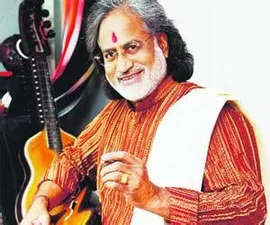


Padam Bhushan Vishwa Mohan Bhatt is an Hindustani classical music instrumentalist who plays the Mohan veena. In an exclusive interview with the Daily Guardian he gives insights about his musical journey and upcoming concerts. Excerpts
Q. How did your musical journey begin?
A. I belong to the Bhatt family of Jaipur which has been devoted to Indian classical music for centuries. When Jaipur city was being established, the then king Sawai Jai Singh called many intellectuals from Telangana. We are Telang Brahmins. Many poets, classical musicians, writers, pandits and others had been given posts in his Darbar and I consider myself lucky to have been born in such an illustrious family of musicians and artists which marks the origin of my journey with pure music.
Q. How did you create Mohan veena?
A. For long time I was searching for an instrument which could incorporate all the sounds and technique of traditional Indian instruments like veena, sitar, sarod, santoor and sarangi in one. I started experimenting on a guitar that was introduced for me by a student from Germany.
I removed the original strings and started putting new ones, as per the needs of Indian classical music. I was very inspired by Pt Brij Bhushan Kabra ji of Jodhpur. He initiated guitar into classical music and was a pioneer. I further developed it and put chikari strings and 12 strings of sympathetic strings, what we call TARA B and 8 on the main strings so the total of 20 strings are there. I was also able to add a tumba.
Q. What was your experience learning from the legendary Pandit Ravi Shankar?
A. Pandit ji was a great master and a wonderful human being. As a guru, no one could match him. He was knowledgeable and humble at the same time. Sometimes not only you learn music but also punctuality, honesty, sincerity, discipline from a guru, which truly resonates with the guru-shishya parampara. Though my instrument was different, it did not matter to him. Maihar gharana from which I belong, is all because of my guru Pt. Ravi Shanker ji with whom I travelled all across the world, in the gharana there are some specialties like elaborated Alaap, Jod Jhala and some interesting layakari which I learned it all from him.
Q. You have been awarded a Grammy Award for the album ‘Meeting by the River’ with Ry Cooder. How was your experience?
A. In 1992 I was touring USA for concerts in 22 cities. On one of the events, I was approached by Water Lily Acoustics Music Company who are famous for releasing unusual recordings. Unusual meaning acoustic recordings without electronic instruments.
After hearing my recording, Ry Cooder found it unique and expressed his desire to collaborate with me. I only had one day because I was touring. So I went to Santa Barbara, LA Cumbre Plaza where we met and started recording at midnight. There was no rehearsal, no written music. It was recorded and released. That was a wonderful lifetime experience for me.
Q. What are your upcoming projects or collaborations?
A. My main aim is to reach out to every corner of the world and spread Indian classical music in my own humble manner. Sometimes we do some experimental recordings as well. But that is just a part of it. My goal for touring abroad or within India is to promote Indian classical music. So, I keep performing all over as much as I can.
Q. What have been some of the most memorial experiences?
A. I am very fortunate that I have been able to perform in countries around the world. The response of audience has been phenomenal. That is the success and power of Indian classical music. Foreigners are surprised by Indian musicians because they do not have any notations in front of them. We create music then and there. What foreigners like is, the purity of our music, the traditional feel and the way an artiste performs in an extempore manner.
Q. What role do you see of Mohan Veena playing in the future of Indian classical music?
A. I am very happy and satisfied to see the response for Mohan veena all over the world and I’m very assured for the great future of Mohan veena. Whatever I can do, I will and I continue to contribute to it so generations after generation are taking up this instrument. In the world, at least in 100 countries I have Mohan veena students. Some of the students are very, very good. In India they are now becoming classified artist of All India Radio and performing very well.
Suman Doonga is an educationist and social worker with a passion to preserve and promote Indian art and culture.